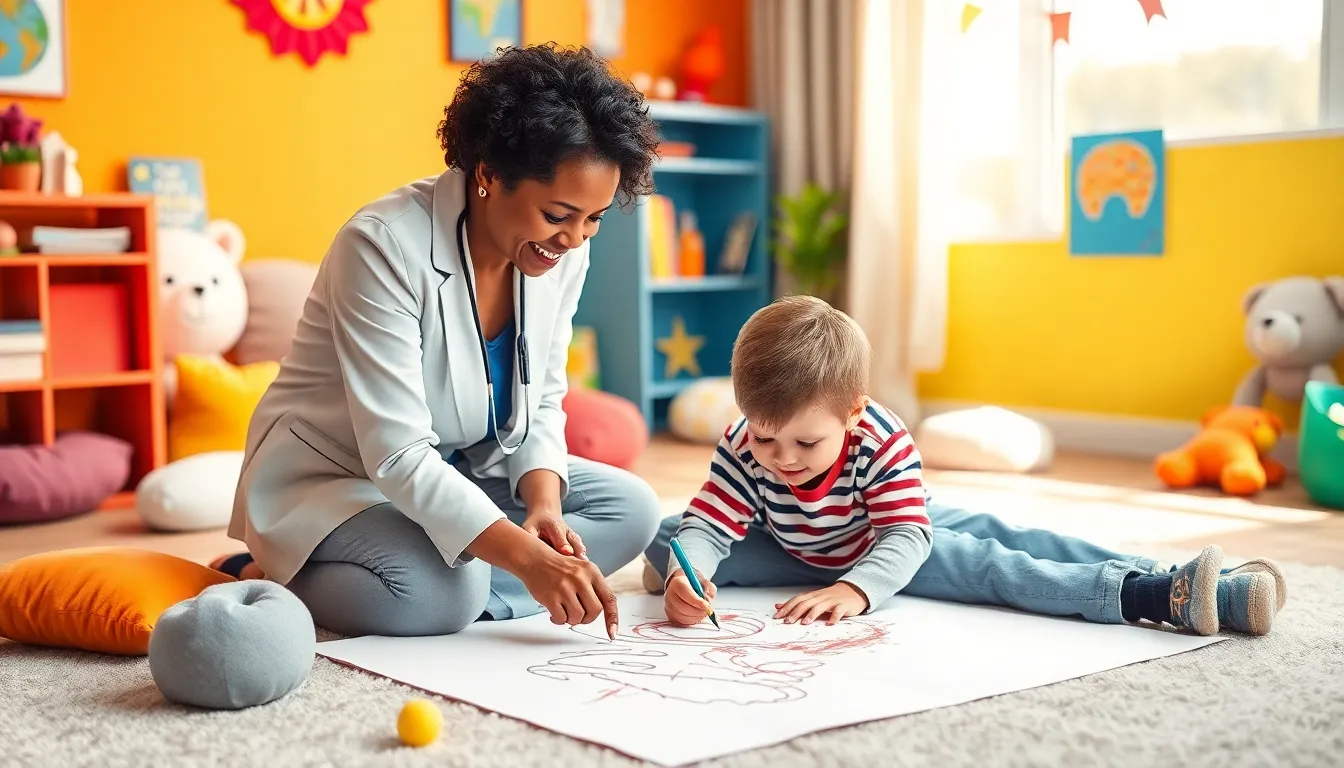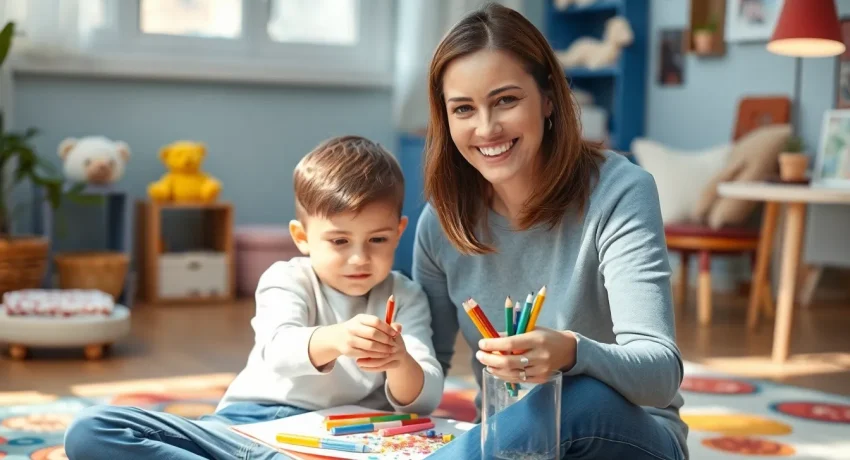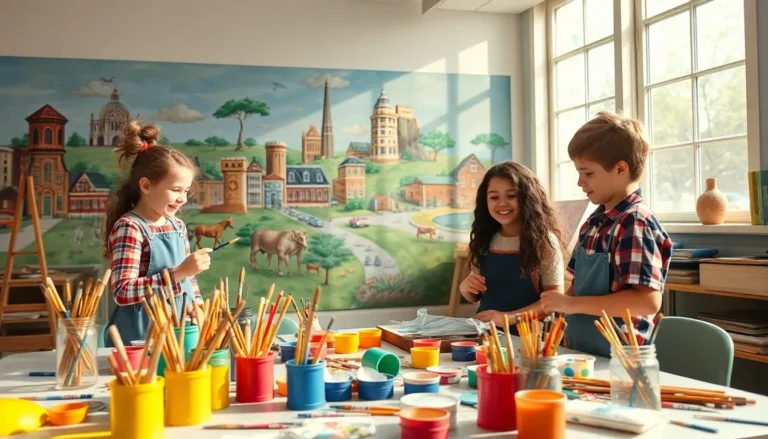Navigating the world of childhood can feel like a rollercoaster ride—full of ups, downs, and unexpected twists. Kids face challenges that can leave them feeling confused or overwhelmed. Enter the child counselor, the superhero in disguise, armed with tools to help children express their feelings and tackle life’s curveballs.
Imagine a space where kids can talk about their worries without fear of judgment. A child counselor creates that safe haven, guiding them through emotional mazes with a sprinkle of humor and a whole lot of understanding. This professional not only helps children but also provides parents with valuable insights into their little one’s minds. So, if you think your child might benefit from a little extra support, it might be time to consider the magic a child counselor can bring to their lives.
Table of Contents
ToggleOverview of Child Counseling
Child counseling focuses on helping children cope with emotional and behavioral difficulties. These professionals use various techniques tailored to each child’s unique needs. Therapeutic approaches may include play therapy, cognitive-behavioral therapy, and family counseling, among others.
Counselors create a supportive space where children express their feelings freely. Trust between the child and counselor encourages open communication. Techniques like art and games often facilitate engagement, making it easier for kids to share their experiences.
Parents play a crucial role in this process. Counselors provide insights that help parents understand their child’s emotional landscape. Workshops or consultations often equip parents with tools for better support at home, reinforcing the child’s progress.
Child counseling aims to address a wide range of issues. Anxiety, depression, ADHD, and trauma are common concerns that prompt families to seek professional help. Early intervention can significantly improve a child’s emotional health, promoting resilience and healthy coping strategies.
Understanding that seeking help is a sign of strength empowers families. Support from a child counselor can enhance communication skills, emotional intelligence, and overall well-being. Each session focuses on achieving specific goals, helping children navigate life’s challenges effectively.
The Role of a Child Counselor

Child counselors play a vital role in supporting children’s emotional development and mental health. They provide a safe space for kids to express their feelings and work through challenges effectively.
Responsibilities and Duties
Child counselors focus on assessing children’s emotional and behavioral struggles. They develop tailored treatment plans, often incorporating various therapeutic techniques. Conducting individual sessions, counselors create engaging activities that encourage self-expression. Monitoring progress during therapy helps counselors adjust methods as needed. Furthermore, they communicate with parents, offering insights and strategies to enhance a child’s well-being at home. Collaboration with schools and other professionals ensures a comprehensive approach to each child’s needs.
Skills Required for Effective Counseling
Effective child counselors possess strong communication skills to connect with children and parents. Empathy remains essential for understanding and validating emotions. Creativity in therapeutic approaches fosters engagement and promotes healing. Counselors must also maintain patience and flexibility, adapting to each child’s unique pace. Knowledge of developmental stages equips counselors to address age-appropriate issues. Building trust with children allows for open dialogue, enhancing the counseling experience. Continuous education on mental health trends ensures counselors provide the best support possible.
Types of Issues Addressed by Child Counselors
Child counselors tackle a variety of issues impacting children’s emotional and social development. These professionals focus on fostering resilience and healthy coping mechanisms.
Emotional and Behavioral Problems
Emotional issues such as anxiety and depression frequently arise in children. Counselors address these challenges through tailored interventions. Behavioral problems like ADHD also receive attention. Parents often report improvements in their children’s emotional regulation after counseling sessions. Techniques like play therapy and cognitive-behavioral therapy equip children to express feelings and develop coping strategies. Conflict resolution skills enhance their ability to navigate emotional turmoil, leading to lasting benefits.
Academic and Social Challenges
Academic struggles present another area where child counselors provide support. Issues like learning disabilities or test anxiety can hinder a child’s performance in school. Counselors help children develop effective study habits and stress management techniques. Social challenges, including bullying and difficulty making friends, further complicate their school experience. Counselors facilitate social skills training to improve peer interactions. These tailored strategies promote healthy relationships and contribute to a more positive school experience.
Benefits of Child Counseling
Child counseling offers numerous advantages that positively impact a child’s emotional and behavioral well-being. Improved emotional regulation often results from professional guidance. Children learn to identify their feelings and develop coping strategies through counseling sessions.
Enhanced communication skills represent another key benefit. When children engage in conversations with counselors, they practice expressing thoughts and emotions freely, leading to increased emotional intelligence.
Building resilience becomes a significant focus in counseling. Early intervention equips children with tools to tackle life’s challenges, fostering a sense of confidence. Increased self-esteem often follows as they realize their ability to manage difficult emotions.
Support for parents is another critical aspect. Counselors provide insights and strategies that parents can use at home, creating a consistent environment for emotional growth. Parents receive guidance on how to approach their child’s challenges effectively.
Social skills improvement is also vital in child counseling. Children learn to navigate relationships and social situations through tailored interventions, reducing issues like bullying or isolation. Better peer interactions become a natural outcome.
Coping with specific issues, such as anxiety or depression, reflects the targeted nature of child counseling. Counselors use various techniques, like play therapy and cognitive-behavioral therapy, to address these issues specifically. Progress monitoring ensures that children move toward their counseling goals.
Ultimately, the support of a child counselor allows children to flourish in various areas of their lives. They develop not only emotional and behavioral skills but also important life skills that contribute to overall well-being.
Choosing the Right Child Counselor
Selecting the right child counselor requires careful consideration of several key factors.
Factors to Consider
Qualifications matter greatly when choosing a child counselor. Look for professionals with a background in psychology or social work and specialized training in child therapy. Experience enhances effectiveness, so prioritize counselors with a track record in addressing specific issues like anxiety, depression, or ADHD. The counseling approach also plays a crucial role; inquire about techniques used such as play therapy or cognitive-behavioral therapy. Rapport is essential, as a child must feel comfortable and safe. Observing initial interactions can provide insight into how well the counselor connects with the child. Moreover, parental involvement is important, so consider counselors who encourage family participation in the process.
Questions to Ask During Consultations
Asking the right questions during consultations can reveal essential information. Start by inquiring about the counselor’s experience with similar cases. Understanding the counselor’s approach will help gauge compatibility with your child’s needs. Also, ask about the therapeutic techniques employed; knowing specific modalities offers clarity on how sessions will unfold. Inquire about progress tracking methods as well; regular updates can ensure effective interventions. Moreover, ask about collaboration with parents and schools, highlighting the importance of a team approach in supporting the child. Finally, discussing session frequency and duration will clarify the commitment involved in the counseling process.
Child counseling plays a vital role in supporting children’s emotional and behavioral development. By fostering a safe environment for expression and growth, counselors empower kids to navigate their feelings and challenges. The skills and insights gained through counseling not only enhance children’s resilience but also equip parents with tools to support their child’s journey.
Choosing the right counselor is crucial for effective therapy. Families should prioritize finding a professional who not only possesses the right qualifications but also establishes a strong rapport with the child. This collaborative effort between child and counselor can lead to meaningful progress and a brighter future for young ones facing emotional hurdles. Investing in child counseling is a proactive step toward nurturing well-rounded and emotionally intelligent individuals.




